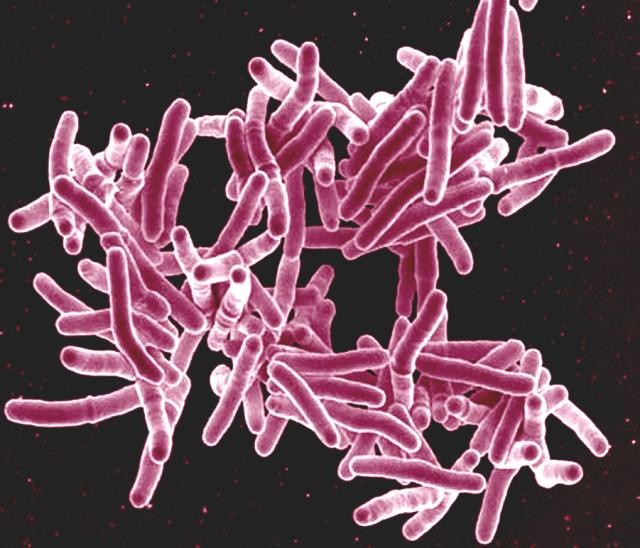New medicines for drug-resistant TB will save lives. But will they be affordable where they are most needed?
Study, published today in New England Journal Medicine, shows that a new regimen is safer and more effective than the current standard of care.
Scanning electron micrograph of Mycobacterium tuberculosis bacteria, which cause TB. Credit: NIAID (CC BY 2.0)
- The current “standard-of-care” treatment regimens for drug-resistant tuberculosis are nine to 20 months and have side effects that cause many patients to stop taking their medication.
- A new regimen, which combines four different drugs, is only six months, has better results with fewer side effects.
- The new regimen may still be unaffordable for some developing countries where drug-resistant tuberculosis is most prevalent.
The standard-of-care treatments for drug-resistant TB (DR-TB) are nine to 20 months and have side effects, which often cause patients to stop taking their medication. But the results of a clinical trial, published on Thursday in the New England Journal of Medicine, show that a new six-month treatment regimen is safer, more convenient, and much more effective than the standard-of-care regimens.
DR-TB is a form of tuberculosis that does not respond to the drugs normally used to treat TB. In South Africa, about 14,000 people get DR-TB every year.
The trial, known as TB-PRACTECAL, was run by Médecins Sans Frontières (MSF). It included 522 patients and was conducted at seven sites in Belarus, South Africa, and Uzbekistan. Participants had TB and were resistant to at least rifampicin, one of the standard drugs for treating TB. (This means rifampicin is not effective, or not as effective as it needs to be, against the strain of TB with which they were infected.)
The trial tested three different regimens against the standard of care used in each of the three countries. It found one to be the most effective and safe: a combination of bedaquiline, pretomanid, linezolid, and moxifloxacin (BPaLM).
A participant’s outcome was considered favourable if, at 72 weeks after being enrolled in the trial, he or she was cured, alive, had finished the regimen, and didn’t get a recurrence of TB. The trial found that nearly 90% patients on BPaLM, administered over six months, had favourable outcomes. By comparison, just over half of the patients on standard-of-care regimens had favourable outcomes.
This was not a large trial. Its details are enormously complicated and in the final analysis there were fewer than 100 participants in the BPaLM group. But it arguably constitutes the best evidence yet for a treatment regimen for DR-TB, a disease that has suffered from a lack of large high-quality clinical trials.
Last week, the trial results spurred the World Health Organisation to change its guidelines, recommending the six-month BPaLM regime for the treatment of DR-TB.
Treatment regimens, currently used for DR-TB are not ideal. “Patients were telling us that the previous regimens were lengthy, ineffective, and gruelling and that the side effects were worse than the disease itself,” said Dr Bern-Thomas Nyang’wa, MSF’s medical director and chief investigator of the trial.
Sheilly Gupta, communications advisor for MSF, told GroundUp that because TB is most prevalent in developing countries, it has not become a profit-making business for pharmaceutical companies. This means there has been very little research and development on TB drugs, and new TB drugs such as bedaquiline are few and far between. Meanwhile, resistance to existing drugs is growing, leading to an increase in DR-TB.
Concerns remain about the affordability and accessibility of BPaLM. The Global Drug Facility (GDF), which works to facilitate access to affordable TB treatment, has provided a lowest global price of $600 (R10,300). But MSF says the price should be below $500 (R8,600) to be affordable.
Good news, though, is that the price of pretamonid was recently reduced by $96, potentially bringing the price of BPaLM to just over $500.
Bedaquiline is currently part of the first-line regimen for DR-TB in South Africa, with a six-month course costing about $400 (R6,900) by itself. Researchers have estimated it could be manufactured and sold for profit at $102 (R1,760).
Gupta says that because the new drugs are still under patents, there is no generic competition and prices remain high.
South Africa is currently using a nine-month regimen containing seven drugs for DR-TB. BPaLM will shortens this to six months, with fewer drugs, and is more cost effective.
MSF is enrolling 400 patients across five countries on the new treatment regimen and is planning to implement it in eight more countries in 2023.
Support independent journalism
Donate using Payfast

Next: The most borrowed books from five Cape Town libraries
Previous: Activist challenges law that bars naming accused in rape cases
© 2022 GroundUp. This article is licensed under a Creative Commons Attribution-NoDerivatives 4.0 International License.
You may republish this article, so long as you credit the authors and GroundUp, and do not change the text. Please include a link back to the original article.
We put an invisible pixel in the article so that we can count traffic to republishers. All analytics tools are solely on our servers. We do not give our logs to any third party. Logs are deleted after two weeks. We do not use any IP address identifying information except to count regional traffic. We are solely interested in counting hits, not tracking users. If you republish, please do not delete the invisible pixel.

